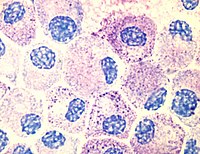
T‐2 toxin cytotoxicity mediated by directly perturbing mitochondria in human gastric epithelium GES‐1 cells
Sign Up to like & getrecommendations! Published in 2020 at "Journal of Applied Toxicology"
DOI: 10.1002/jat.3973
Abstract: T‐2 toxin is one of the most toxic trichothecenes and harmful to human health and animal husbandry. The mechanism underlying its growth suppression remains unclear, especially for mitochondrial damage in human gastric epithelial cells. In… read more here.
Keywords: dna damage; ges cells; directly perturbing; cell death ... See more keywords

MiR-877-5p targets PDK-1 to promote aspirin-induced apoptosis in gastric mucosal cells.
Sign Up to like & getrecommendations! Published in 2021 at "Die Pharmazie"
DOI: 10.1691/ph.2021.0926
Abstract: This study aimed to investigate the role of miR-877-5p in aspirin-induced gastric mucosal injury. MiRNA microarray analysis was performed using paired gastric mucosal samples to find differentially expressed miRNAs. miR-877-5p was selected for subsequent analyses.… read more here.
Keywords: ges cells; aspirin induced; mir 877; apoptosis ... See more keywords

Rutin alleviated acrolein-induced cytotoxicity in Caco-2 and GES-1 cells by forming a cyclic hemiacetal product
Sign Up to like & getrecommendations! Published in 2022 at "Frontiers in Nutrition"
DOI: 10.3389/fnut.2022.976400
Abstract: Acrolein (ACR), an α, β-unsaturated aldehyde, is a toxic compound formed during food processing, and the use of phenolics derived from dietary materials to scavenge ACR is a hot spot. In this study, rutin, a… read more here.
Keywords: ges cells; cytotoxicity; cyclic hemiacetal; rac ... See more keywords

Extracellular vesicles from gastric epithelial GES-1 cells infected with Helicobacter pylori promote changes in recipient cells associated with malignancy
Sign Up to like & getrecommendations! Published in 2022 at "Frontiers in Oncology"
DOI: 10.3389/fonc.2022.962920
Abstract: Chronic Helicobacter pylori (H. pylori) infection is considered the main risk factor for the development of gastric cancer. Pathophysiological changes in the gastric mucosa initiated by this bacterium can persist even after pharmacological eradication and… read more here.
Keywords: ges cells; extracellular vesicles; cells infected; helicobacter pylori ... See more keywords